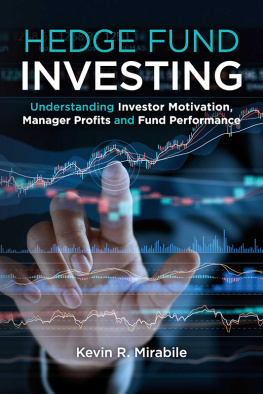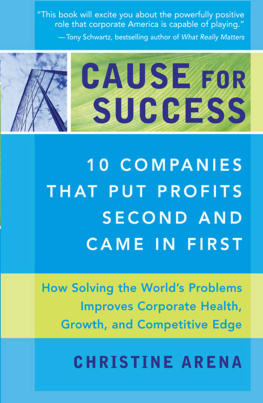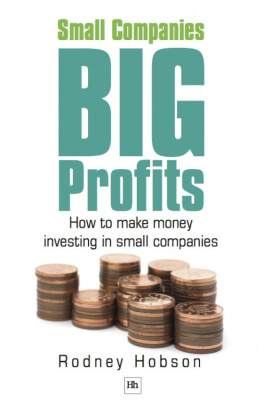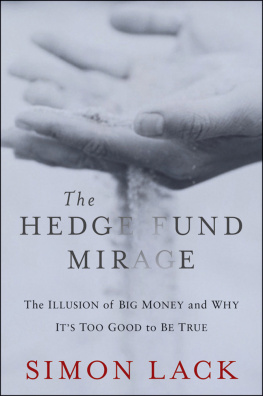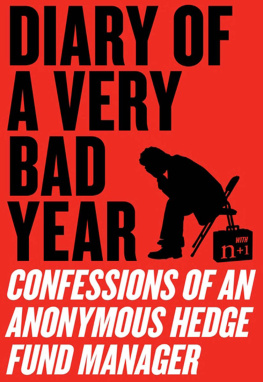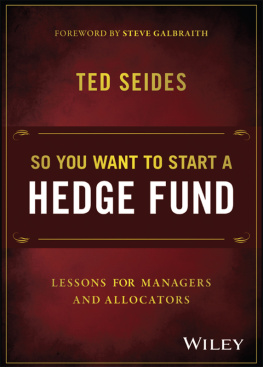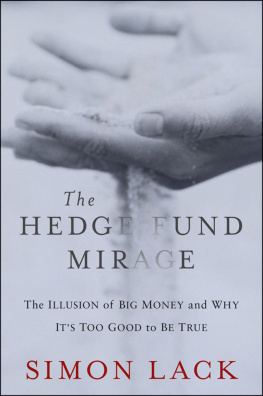Dead Companies Walking
How a Hedge Fund Manager Finds Opportunity in Unexpected Places
Scott Fearon
with
Jesse Powell

The author and publisher have provided this e-book to you for your personal use only. You may not make this e-book publicly available in any way. Copyright infringement is against the law. If you believe the copy of this e-book you are reading infringes on the authors copyright, please notify the publisher at: us.macmillanusa.com/piracy .
Dedicated to everyone who loves, educates, worries about, and cares for intellectually and physically disabled children and adults. You are selfless, unsung heroes.
Contents
Introduction
If you want to increase your success rate, double your failure rate.
Thomas J. Watson
If you dont know who you are, the stock market is an expensive place to find out.
George Goodman, aka Adam Smith
Like a lot of quintessentially American stories, my career in money management began with a road trip. It was the summer of 1983. Id just graduated from business school in leafy Evanston, Illinois, and landed my first job at the largest bank in Texas. On a clear, breezy summer morning, I piled three suitcases worth of my belongings into the trunk of my powder blue Oldsmobile Delta 88 and headed for the banks headquarters in Houston. I was eager to start my new life as a financial executive. The economy of Texas was riding a ten-year boom. A barrel of light sweet crude was going for over thirty bucks, three times more than in the mid-1970s, and just about everyone expected it to go a whole lot higher.
Little did I know, as I tooled down Highway 57, I was actually driving toward a catastrophe. A Category Five economic hurricane was brewing off the coast of Houston, and it hit shortly after I arrived in town. The price of oil began to fall. Then, in January 1986, Saudi Arabia opened the spigots and swamped the market with cheap crude. In a single day, oil crashed below $10 a barrel, and the entire economy of Texas imploded. Scores of energy companies went bankrupt. Unemployment shot up. For Sale signs swung in the yards of abandoned houses. Vast asphalt parking lots sat vacant in front of shuttered department stores. Entire neighborhoods turned into ghost towns.
Just like that, my budding career seemed to be over before it started. The bank immediately froze my $30,000-a-year salary, and every morning I came in to work expecting to find a pink slip pinned to the wall of my cubicle.
If this sounds familiar, it should. It was a small, regional preview of the global meltdown that came in the wake of the 2008 financial crisis. But for those of us who were in East Texas in the 1980s, it didnt seem small or regional. It was cataclysmicand it shaped me as an individual, a businessperson, and an investor. What I didnt realize at the time was that living through that bust was the luckiest thing that would ever happen to me. It taught me perhaps the single most important lesson about business and about life: Things go wrong more often than they go right. Failure is actually a naturaleven crucialelement of a healthy economy. And the people who are willing to acknowledge that fact can make a hell of a lot of money.
The Business of Failure
Shortly after the collapse, I left Houston for the San Francisco Bay Area. From 1987 to 1990, I managed a mutual fund in downtown San Francisco. Since 1991, Ive run a hedge fund from a modest Marin County office park in the shadow of Mount Tamalpais. Ive lived through several more booms and busts since then, but Ive almost always managed to make a profit, even in the worst of times. Over twenty-three years, my fund rose roughly 1,100 percent after all feessignificantly higher than the S&P 500s total return during that same period. I credit one thing above all for this success. Long ago, I learned to appreciate one of the most enduring and important American business traditions: failure.
While most of my funds investments are in the stocks of companies I believe are undervalued, I also look for stocks that are over valued by the markets. My specialty is identifying what I call dead companies walkingbusinesses on their way to bankruptcy and a zeroed-out share price. To the noninvestor, earning money on losing stocks might sound counterintuitive. But short selling is a routine, if widely misunderstood, investment strategy. And while it may seem macabre to profit on the misfortunes of others, investors like me make our markets stronger and more efficient.
We Americans like to think we have the greatest economy in the history of the world. And we do. But most people dont really understand why. Its not just because of our plentiful natural resources or our global dominance or our business-friendly politics. Its because, until recently anyway, we have allowed ourselves and our markets an unprecedented amount of freedomnot only the freedom to grow and make obscenely large profits, but also the freedom to fall flat on our faces.
As paradoxical as it seems, thriving, dynamic market economieslike ours has been for most of its historyembrace failure. In contrast, economies that try to manage failure by propping up slumping businesses lag behind because they dont grow or innovate. Japan is probably the best recent example of this phenomenon. The country is notorious for keeping moribund but politically favored corporations alive, and the results of that strategy are plain. It has been mired in a zero-growth economy since I first tried sushi in the late 1980s.
I spend a good deal of time visiting and studying companies in Silicon Valley. That place has taken on an almost mythical status in the business world, and deservedly so. Its chock-full of smart, creative people. Without all the high-tech innovations theyve come up with in the last half century, the global economy would be dead in the water. But no one talks about the real reason the Valley is such fertile ground: failure. Its the biggest, most volatile petri dish of raw capitalism on the planet. New ideas and companies are put to the test rapidly and ruthlessly. The good ones survive. The bad ones dont. Sure, they might get some buzz and even some big initial funding. But if they dont have what it takes, they die a quick death. Even when the region is doing well, dozens of unheralded companies come on the scene every year, only to fade away.
The Austrian economist Joseph Schumpeter called this process creative destruction. Its a harsh but vital process. It weeds out subpar ideas and gives good ones like Google the nourishment they need to grow. Short-sellers help make this happen. We identify the duds, which is good not only for the larger economy but also for the people involved in those ventures. Even the smartest people can get caught up in bad ideas or bad ways of doing business. The sooner they are disabused of these flawed practices, the better for everyone.
Nothing Special
The money manager David Rocker identified three types of businesses that falter and go under: frauds, fads, and failures. The fraudslike WorldCom and Enronget most of the attention, because their stories are usually dramatic, full of intrigue and greed and deception. But frauds are an infinitesimal fraction of the number of companies that fail every year. Fadscompanies or products that explode onto the scene before fizzling out, like Pac-Man and the Hula Hoopare also relatively rare. Most companies that enter bankruptcy fall into the third category. Theyre just plain old failures, the result of bad ideas, bad management, or a combination of the two.
As the manager of my hedge fund, Ive shorted the stocks of over two hundred companies that have eventually gone bankrupt. Many of these businesses started out with promising, even inspired ideas: natural cures for common diseases, for example, or a cool new kind of sporting goods product. Others were once-thriving organizations trying to rebound from hard times. Despite their differences, they all failed because their leaders made one or more of six common mistakes that I look for:
Next page

